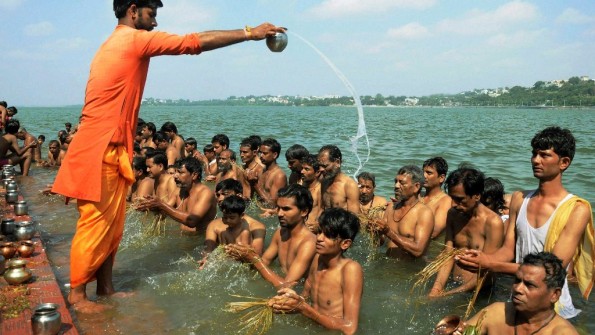By Sangeeta Santokee, Swaha Hindu College
Holy water is delivered from the Ganges and Jamuna Rivers that people collect for their Hindu ceremonies. The Ganges is a transboundary river of Asia which flows through the nations of India and Bangladesh while the Jamuna River is one of the three rivers that is in Bangladesh. It is the main distributary channel of the Brahmaputra River as it flows from India to Bangladesh. People from around the world collect water from these holy rivers to use in their sanskaars at home. Water or pani has many significant uses in Hindu ceremonies, namely purification, the blessing of items in puja and for sanskaars such as the janeu (sacred thread) ceremony.
Firstly, one of the uses of water in Hindu ceremonies is purification, more so self-purification. It is noted that the only form of Bhagwan that one can fully immerse oneself in is the form of God which is Lord Varuna. For example, Hindus go to the beach for Kaartik Nahaan to worship Ganga Maata; after worshipping Ganga Maata, people take a bath in the water to purify themselves. Similarly, Ganga Dhaara is another religious opportunity where Hindus go to the rivers and perform puja before taking a spiritual bath, hence the reason why one great significance of water is purification.
Another significance of water in Hindu ceremonies is for the blessing of items in puja. If you are going to do a puja, some of the items you will need include rice, camphor, sindoor, saffron, incense sticks, deeyas, wick, janeu, prasad, honey, googol, oil, ghee, pine sticks, navgraha sticks and of course, the most important one, the sacred water. The water inside the kalsa that is placed on the bedi in a puja is said to be the purest water in all of the surroundings. Notably, Lord Krishna said in the Bhagavad Gita that the water in the kalsa is the divine essence. Furthermore, water is used to wash the hands of the devotees, to sip and to bless the items to be offered to Bhagwan. Thus, water is essential in Hindu ceremonies.
Finally, the last significance of water in Hindu ceremonies is for the yajnopavita sanskaar. One of the essential practices of the yajnopavita or the janeu ceremony is for the young initiate to shave his head by a water course. The shaving of the head is usually done to remove all impurities and to indicate a state of detachment from the material world. Thus, water is again needed for this highly revered sanskaar.
In conclusion, water has much significance in Hindu ceremonies. Bhagwan said to his devotees, “Offer me a leaf, a flower or water with love and devotion and I will accept your offering and answer your prayers.”
Additionally, it is advised that upon a person’s last breath, a drop of tulsi water or Ganga jal liberates the soul. As such, water, being an essential element in Hindu ceremonies is used for self-purification, for the blessing of items in puja and in sanskaar such as the janeu or yajnopavita ceremony. Thus, water or pani is sacred and it is our duty as Hindus to keep our water courses clean and well maintained.




Sangeeta Santokee
i have learnt a lot from doing this essay